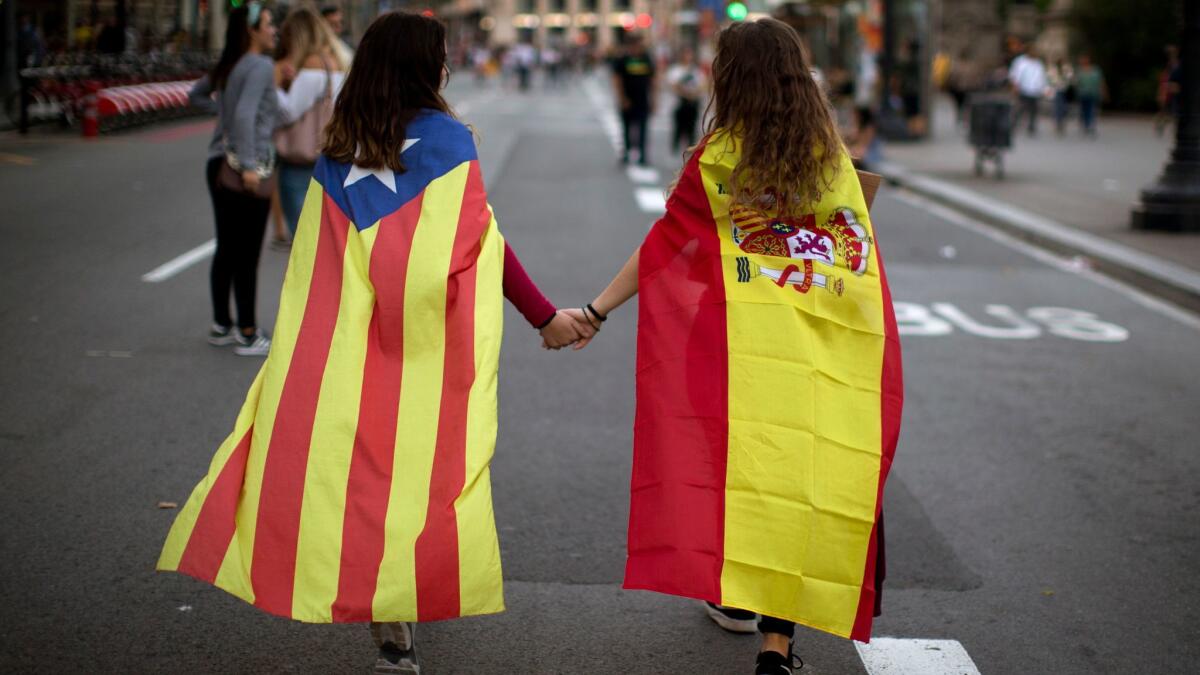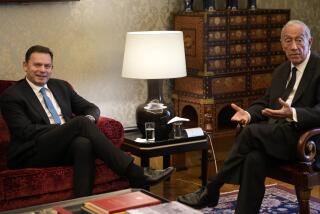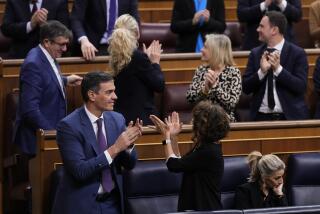Voters in Spain’s Catalonia are set to elect a new parliament, but secession issue remains divisive

Isabel Campos expects to go to the polls Thursday morning thinking of her ancestors.
Her parents and grandparents are from outside Catalonia, the prosperous northeastern Spanish region whose parliamentary election Thursday is at the heart of a fight over identity and independence from or unity with the country’s central government.
The 33-year-old, who lives in Barcelona, the region’s capital, said she will vote for a political party committed to keeping Catalonia as part of Spain. Her reasoning is simple: She wants to live in the same country where her relatives grew up.
“We are playing with the future of Catalonia and Spain,” Campos said as she waited in the cold Tuesday night to attend a rally for the anti-independence party Ciudadanos. “I don’t want to need a passport to get to other parts of Spain.”
On Thursday, a polarized Catalonia votes for the fourth time in seven years on a new regional government — an election that could serve as a de facto referendum on independence, though experts say it’s unlikely to produce decisive results.
The push for the region of 7.5 million people to separate from Spain has instigated the country’s deepest political crisis in its 40 years of democracy after the dictatorship of Gen. Francisco Franco, who died in 1975.
After an Oct. 1 referendum considered illegal by the central government and boycotted by many voters overwhelmingly favored secession, Catalan leader Carles Puigdemont declared the region independent, spurring Spanish Prime Minister Mariano Rajoy to dissolve the region’s government and call early elections for Dec. 21 to replace it.
Rajoy has said he hopes to return Catalonia to normal and quell the secessionist movement.
The Catalan conflict, which grew in strength two years ago when secessionists won a slim majority in parliament, “radically changed the political map of Catalonia,” said Joan Vintro, a constitutional law professor at the University of Barcelona. “The change has generated a determined political instability.”
Candidates for the 135-member parliament began campaigning in early December on platforms defined primarily by their stance on independence. Other issues, such as health and education, went largely untouched.
The campaign has been unusual, in part because of circumstances that include members of the previous regional government being elsewhere.
Puigdemont has been running a virtual campaign from self-imposed exile in Belgium, where he fled in October. Catalonia’s former vice president, Oriol Junqueras, has campaigned from a jail near Madrid, while he and other incarcerated independentista politicians are being investigated on suspicion of rebellion, sedition and misuse of public funds.
Voter turnout is expected to be high Thursday. The parties vying for power consist of those that favor independence, those that favor a unified Spain and those that are nonaligned. Voters cast ballots by parties and the parties allocate seats for individuals who normally serve four-year terms. Parties must win more than 3% of the vote to gain seats.
The three main pro-independence parties are Puigdemont’s Junts per Catalunya, Junqueras’ Esquerra Republicana and the small far-left Candidatura d’Unitat Popular, or CUP. The main anti-independence party is Ciudadanos.
The election is not expected to be decisive, analysts say, as opinion polls generally have not forecast any party winning a clear majority, meaning that parties would have to form coalitions to govern. To earn a majority and a mandate to govern, a party must win 68 seats in parliament.
The conflict in Catalonia has polarized its citizens. Some people say they have stopped speaking with friends because of rancorous arguments, and others say politics has become a taboo topic.
“We aren’t living a Civil War, but especially in the last months there has been ... a social tension,” said Fernando Sanchez, a parliamentary candidate for the conservative Partido Popular, outside a campaign event where supporters dined and toasted to Spanish unity.
Maria Carmen Marti, 61, said she supports pro-independence parties, which she sees as the only means to stand up to a “robber” Spanish state.
“I’ll vote for Esquerra or Puigdemont,” the Barcelona resident said. “For my parties.”
With the election coming just days before Christmas, some people worry about political arguments with family members.
Sara Alvarez won’t celebrate Christmas this year with her brother or sister-in-law. Alvarez said her sister-in-law, who supports independence, attacked her on Facebook recently for a post about Spanish unity, and their relationship worsened in the months since.
“They are very radical. They have treated me badly,” Alvarez, 56, said at a rally for Ciudadanos.
But for some, the contentious political moment has brought people together in support of a common cause.
Enric D’Angelo, 63, who supports independence, met guitarist Francisco Muñoz Anta, also an independence backer, recently while strolling around the Plaza Sant Jaume, where the seat of the regional government is located and where Muñoz performs, and they became friends.
Muñoz plays guitar for a few minutes, then wraps a cloth around his mouth and stands completely still for 15 more minutes to protest the jailing of pro-independent members of the former Catalan government. The two men drink coffee together after each performance.
“We are different people,” D’Angelo said of Catalans. “We are another country, another nation.”
Bernhard is a special correspondent.
More to Read
Start your day right
Sign up for Essential California for news, features and recommendations from the L.A. Times and beyond in your inbox six days a week.
You may occasionally receive promotional content from the Los Angeles Times.






